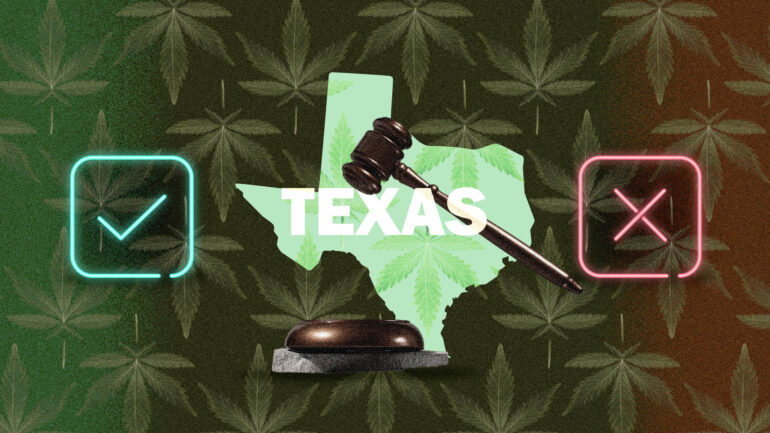Key Takeaways
- The use, possession, sale, distribution, production, growing, and cultivation of recreational marijuana is illegal in Texas
- Medical marijuana is legal but heavily regulated in Texas. Eligible patients with qualifying conditions have access to marijuana-derived oil carrying 1% THC
- Penalties for marijuana possession are harsh, ranging from a class C misdemeanor to a class A felony
- Some counties (El Paso, Dallas, Plano) have reduced penalties for weed, essentially decriminalizing simple use and possession
Texas has some of the strictest marijuana laws in the entire United States.
Recreational adult-use marijuana is illegal, and medical marijuana is legal but heavily regulated. Only patients with qualifying conditions such as cancer, autism, epilepsy, post-traumatic stress disorder, and multiple sclerosis can access medical marijuana.
Penalties for marijuana use, possession, and sale fall under penalty group 2 of the Texas Controlled Substances Act, which can range from 180 days in jail and a $2,000 fine to life imprisonment and a $50,000 fine. Growing weed is also illegal, and punishments are similar to possessing, using, and selling marijuana.
Hemp-derived Delta-8 THC is currently legal in Texas. The use, possession, sale, distribution, and production of delta-8 products are allowed under Texas state law. Similarly, hemp-derived CBD is perfectly legal and widely available across Texas.
Is weed legal in Texas?
No, the use, possession, sale, distribution, production, and cultivation of marijuana have been illegal in Texas since 1931. Medical marijuana is somewhat legal but controlled under stringent conditions. Only patients with certain qualifying conditions are eligible for medical marijuana. As of 2021, just over 7,000 patients are listed in the medical marijuana registry, but only 348 physicians can prescribe medical marijuana.
Is recreational (adult-use) marijuana legal in Texas?
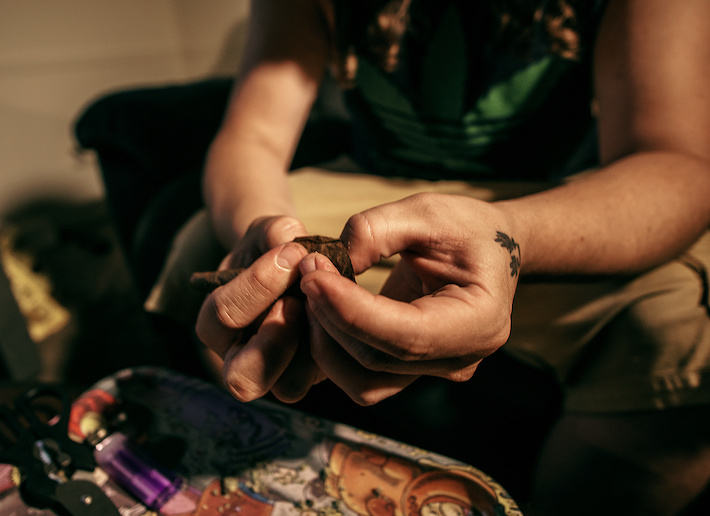
No, recreational marijuana is illegal in Texas under Schedule I of Texas Controlled Substances Act (TCSA), which coincides with the federal government’s Controlled Substances Act (CSA). This legal status means the use, possession, sale, distribution, and production of adult-use marijuana is prohibited and punishable under Texan state law.
Schedule I substances are defined as having a high potential for abuse with no accepted medical value or safety profile. Other substances classified as Schedule I controlled substances include heroin, LSD, MDMA (ecstasy), and psilocybin.
Is medical marijuana currently legal in Texas?
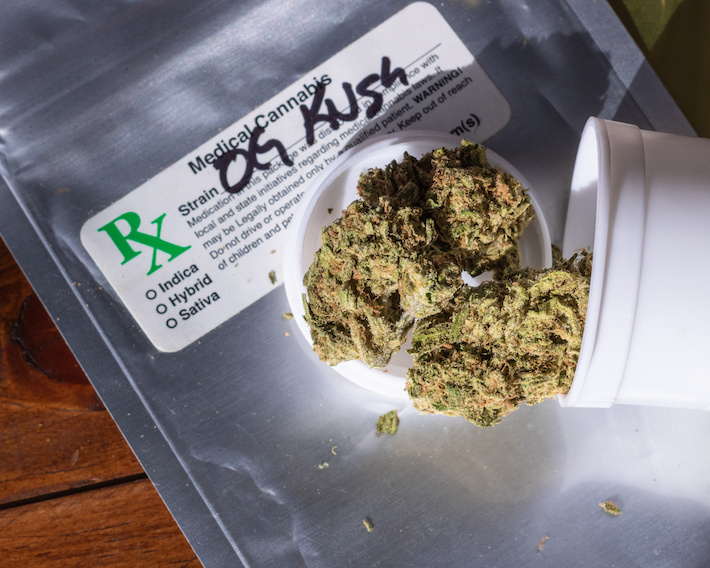
Yes, medical marijuana is currently legal in Texas but controlled under stringent regulations.
Medical marijuana was first legalized in 2015 under the state’s own Texas Compassionate Use Act (Senate Bill 339), which allowed patients with intractable epilepsy access to cannabis oil carrying less than 0.5% THC.
Qualifying conditions were later expanded with the passing of TX House Bill 3703 in 2019, which allowed patients with terminal cancer, autism, seizure disorders, and incurable neurological disorders access to medical marijuana.
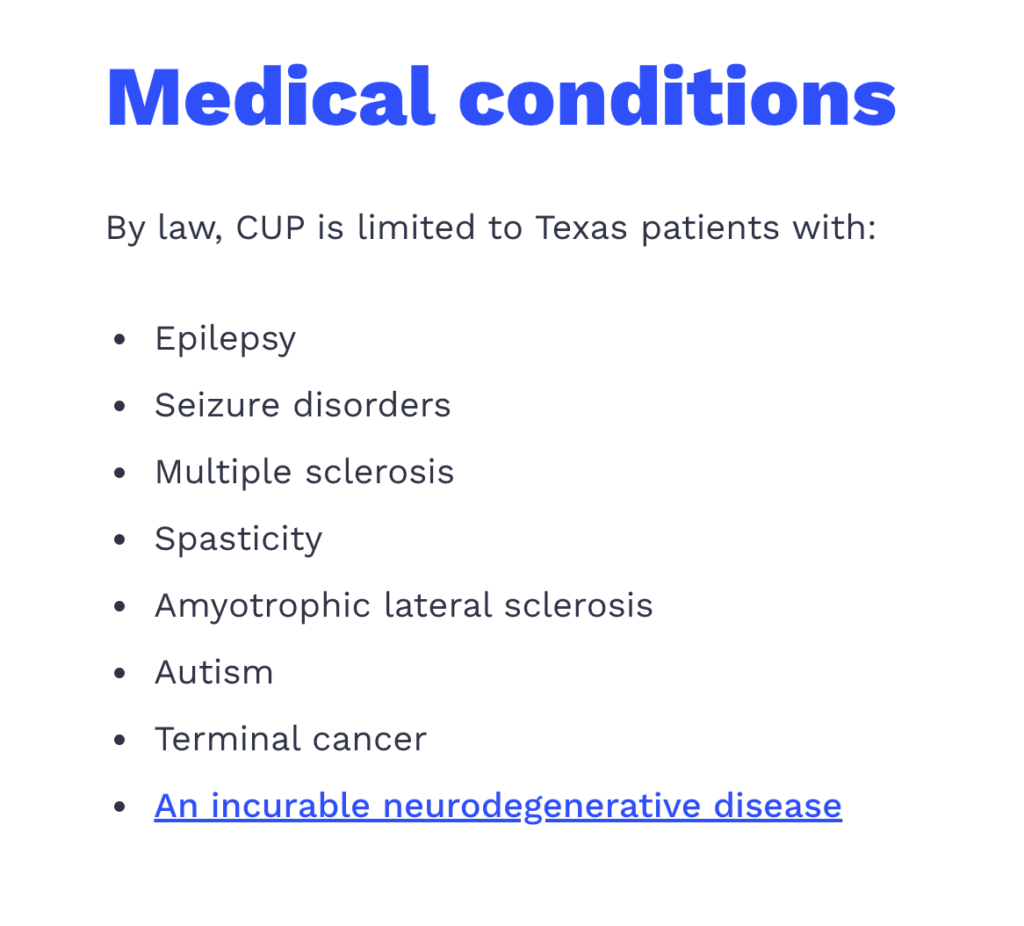
In September 2021, Texas lawmakers passed TX House Bill 1535, raising the THC limit from 0.5% to 1%. Another draft proposed raising it to 5% but was removed by the Senate in favor of 1%. The bill also expanded the qualifying conditions to include all types of cancer and post-traumatic stress disorder (PTSD).
Penalties for marijuana possession in Texas
Texas marijuana possession laws are some of the strictest in the country and are punishable under penalty group 2 of the Texas Controlled Substances Act.
The possession or sale of two ounces or less of marijuana is a class B misdemeanor, which can land you in jail for up to 180 days, alongside a potential fine not exceeding $2,000.
Possession of two to four ounces of marijuana is a class A misdemeanor, punishable by up to one year in prison, along with a fine not exceeding $4,000.
Possessing larger quantities of marijuana, especially with the intent to supply, is a state felony. The mandatory minimum prison sentence for having over 2,000 lbs of marijuana is five years, and a maximum prison sentence is 99 years.
Is cannabis decriminalized in Texas?
No, cannabis isn’t decriminalized in Texas. State law criminalizes the use, possession, sale, distribution, and production of cannabis carrying above 0.3% THC, or above 1% THC if eligible for medical cannabis.
However, certain Texan cities, counties, and municipalities have reduced penalties for marijuana possession. The most recent are Dallas and Plano.
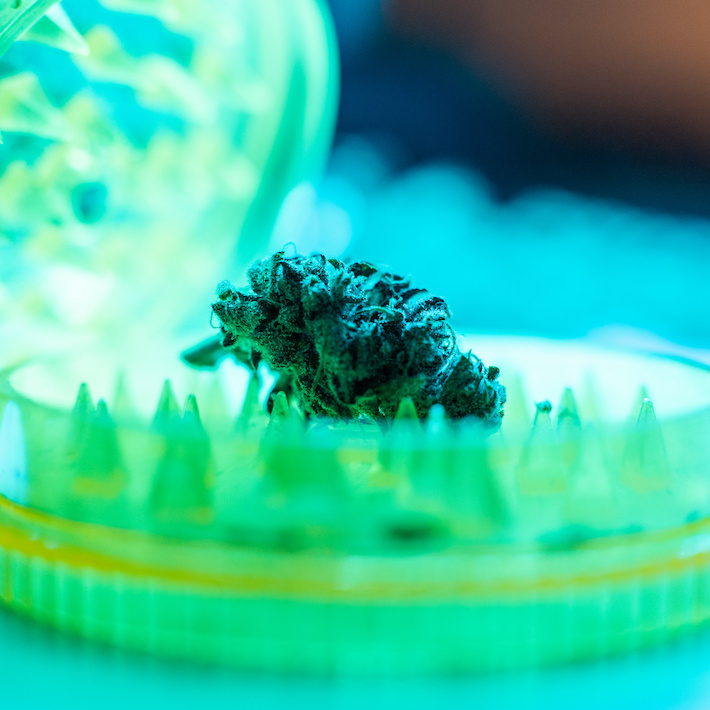
In March 2021, Dallas Police Chief Eddie Garcia announced changes to his department’s marijuana policy. Dallas police officers will not charge users carrying two ounces of cannabis or less. Previously, Dallas City Council implemented a cite-and-release program allowing its officers to issue misdemeanor tickets to offenders caught with four ounces of cannabis or less.
Later, in April 2021, Plano essentially decriminalized low-level cannabis possession. Plano Police Chief Ed Drain announced his officers would cease arresting people caught in possession of two ounces of cannabis or less, instead issuing misdemeanor tickets for possession of drug paraphernalia.
The potential legalization of cannabis on the horizon in Texas?
Support for cannabis legalization in Texas is growing. According to a recent 2021 poll by the University of Houston, 67% of Texans want to see the sale and use of recreational marijuana legalized in the state, with 79% of Democrats and 70% of independents favoring its legalization.
However, what’s most surprising is 51% of Texan Republicans also want recreational cannabis legalized, especially when cannabis reform legislation has historically been rejected by the GOP-dominated state legislature.
In another poll by CBD Oracle, 53% of Texans said that weed should be legal for medical use and 40% think it should be legal for recreational use. This leaves just 8% of respondents who believe that weed should not be legal for any purpose.

Could this voter opinion on cannabis legalization show a glimpse of what’s to come in 2022? We wouldn’t hedge our bets on it. Cannabis reform in Texas is met with tough resistance. Of the 51 attempts to amend the existing cannabis law in 2021, 49 failed to pass.
Senate Bill 90 was the most promising. The bill proposed authorizing the possession, use, cultivation, sale, distribution, and delivery of medical cannabis for qualifying patients with severe or debilitating medical conditions. Unfortunately, it didn’t pass the committee stage and died shortly after.
Is growing weed in Texas illegal?
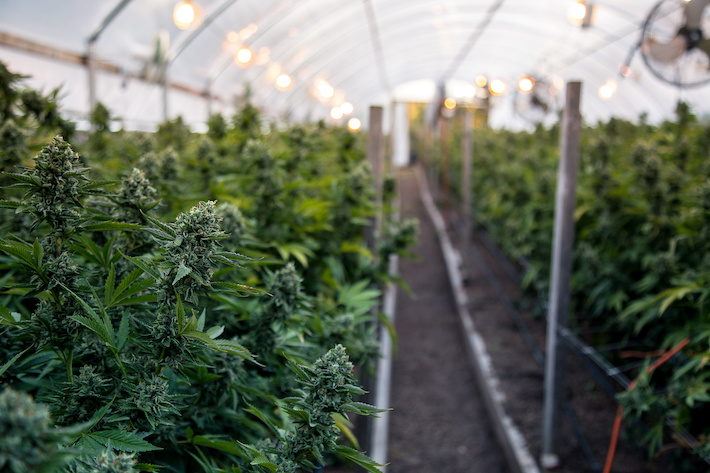
Surprisingly, no state laws prohibit the growing or cultivation of weed in Texas, but that doesn’t mean it’s permitted or legal. Texas state law punishes weed growers and cultivators quite harshly. Depending on the quantity and intent, punishments can range from 180 days imprisonment to $50,000 fines.
Is CBD legal in Texas?
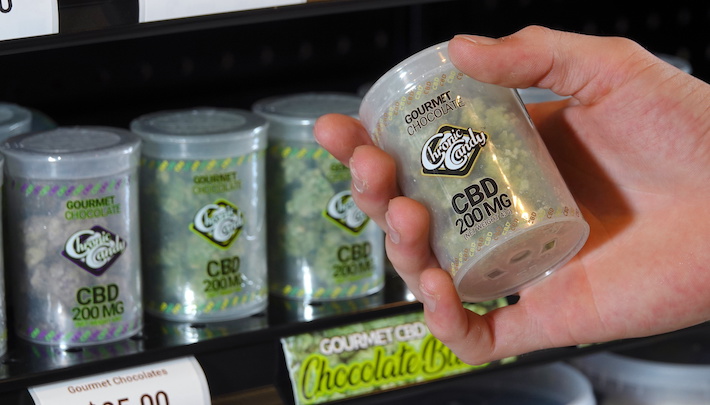
Yes, CBD is legal in Texas, provided it’s derived from hemp plants carrying up to 0.3% THC (by dry weight). As defined in Section 121.001 of the Texas Agriculture Code, all hemp plant parts, including derivatives, cannabinoids, isomers, salts, and acids, are legal under Texan state law. This means the use, possession, sale, distribution, and production of hemp-derived CBD is permitted within the state.
Related: Hemp vs. marijuana, what’s the difference?
Is delta-8 THC legal in Texas?
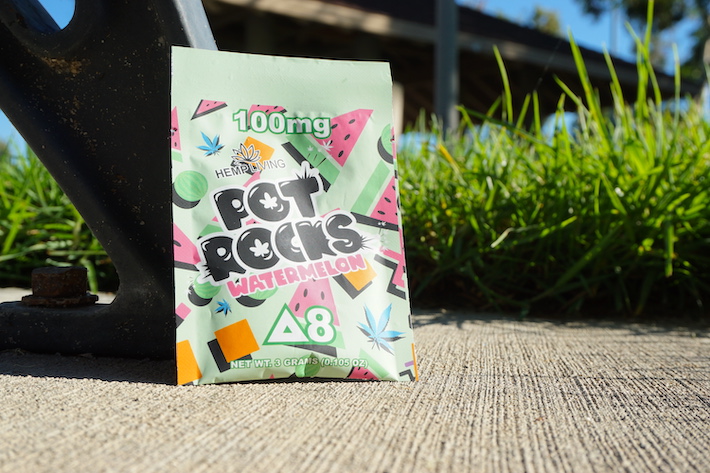
Yes, delta-8 THC is currently legal in Texas, as long as it’s sourced from hemp plants carrying no more than 0.3% THC (by dry weight). This means the use, possession, sale, distribution, and production of delta-8 and delta-8 products are allowed under state law. Here’s a recent coverage of the delta-8 legal battle in Texas.
The history and legislation surrounding Texas prohibiting delta-8
Delta-8’s legality was thrown into question earlier this year when the DEA issued an Interim Final Rule (IFR) seeking to verify delta-8’s federal legality, potentially scheduling it a “synthetically-derived” controlled substance. The DEA’s final rule resulted in 18 US states preemptively banning or restricting delta-8 products.
In early 2021, Texas lawmakers attempted to pass TX HB2593, drafted initially to reduce penalties for THC possession but later amended to limit the quantity of all tetrahydrocannabinols to 0.3% per product, meaning all hemp-derived products carrying more than 0.3% delta-8 would be prohibited. Thankfully, the bill failed to pass and died in the legislature, and delta-8 remains legal in Texas.
However, in October 2021, the Texas Department of State Health Service (DSHS) updated its website, stating delta-8 is prohibited and now under Schedule I of the Texas Controlled Substances Act.
Hometown Hero, an Austin-based CBD company, sued the Texas DSHS, arguing all hemp-derived products are legal under state and federal law. The first court hearing denied Hometown Hero’s request for the delta-8 ban to be lifted. The second court hearing ruled in favor of Hometown Hero and lifted the temporary ban on delta-8 products.
Delta-8 is now temporarily legal in Texas
On Monday 8th November 2021, state District Judge Jan Soifer granted Hometown Hero’s request to lift the delta-8 ban in Texas, albeit temporarily. Currently, it’s now legal to use, possess, sell, distribute, and produce delta-8 in Texas.
The DEA now claims delta-8 is not a controlled substance
In a shocking turn of events, the DEA has quietly claimed hemp-derived delta-8 THC is not a controlled substance under federal law, as announced in two separate statements.
The first statement comes from a June 2021 video webinar titled “Town Hall with USDA and DEA”. The video features the USDA, DEA, and Florida Department of Agriculture and Consumer Services (FLDACS) representatives.
During the conversation, FLDACS representative, Holly Bell, asks DEA representative, Sean Mitchell, about delta-8’s federal legality and how it applies to Florida. His reply is as follows:
“What I want to say, and I’ll be very, very deliberate and clear. At this time—I repeat, at this time—per the Farm Bill, the only thing that is a controlled substance is delta-9 THC greater than 0.3% on a dry weight basis.”
The second statement is a letter sent by the DEA to the Alabama Board of Pharmacy addressing delta-8’s federal legality.
The letter, dated September 15, 2021, clarifies all cannabinoids extracted from hemp plants carrying no more than 0.3% delta-9 by dry weight are not controlled substances.
The letter also states tetrahydrocannabinol that’s in or derived from the cannabis plant—not synthetic tetrahydrocannabinol—is subject to being excluded from control as a tetrahydrocannabinol in hemp.
Conclusion: Stay away from recreational marijuana in Texas
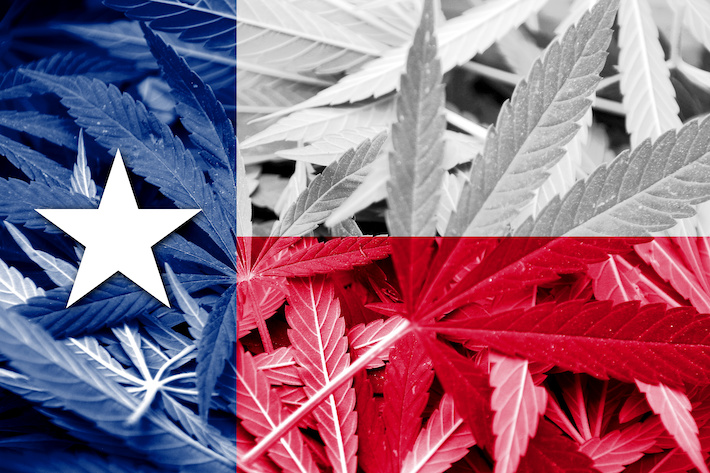
You do not want to be caught with weed in Texas. Most counties and municipalities have a strict zero-tolerance rule on all drugs, including marijuana. Even in areas where it’s essentially decriminalized, heavy-handed penalties still happen.
However, if you suffer from any qualifying conditions and are eligible to receive medical cannabis, Texas still isn’t great. A 1% THC limit is restricting and might not effectively treat chronic conditions, especially not in the long run.
